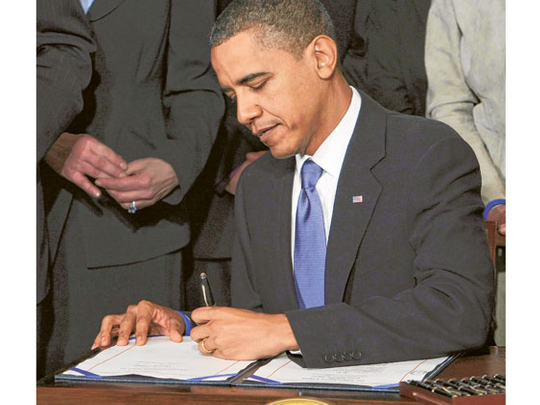
Atlanta: A federal appeals court struck down as unconstitutional the central provision of President Barack Obama's health care law requiring most Americans get coverage, bringing the 2010 act ever closer to the US Supreme Court.
The two to one ruling is in direct conflict with an earlier decision by a federal appeals panel in Cincinnati, which upheld the individual mandate. The provision exceeds Congress's power to regulate commerce, a US appeals panel in Atlanta ruled Friday, affirming in part a lower court in a suit by 26 states.
"This guarantees that the Supreme Court will rule on the constitutionality of the individual mandate, and makes it very likely that the court's ruling will come by the end of June 2012," said Kevin Walsh, an assistant professor at the University of Richmond School of Law in Virginia.
The US Supreme Court often decides to accept cases where two or more of the federal appeals courts are in disagreement. Plaintiffs in the Cincinnati case have already asked the high court to review that ruling. A third federal appeals panel in Richmond has heard arguments in two cases brought over the health care law and has yet to rule.
Rejected
In Friday's ruling, the majority wrote that the "mandate represents a wholly novel and potentially unbounded assertion of congressional authority." The law requires "Americans to purchase an expensive health insurance product they have elected not to buy, and to make them repurchase that insurance product every month for their entire lives."
While throwing out the mandate, the panel overruled the lower court's decision in that case to reject the entire health care law as a result.
"Excising the individual mandate from the act does not prevent the remaining provisions from being fully operative as a law," Chief US Circuit Judge Joel Dubina, a Republican appointee, and US Circuit Judge Frank M. Hull, a Democratic appointee, wrote. Hull is the first judge appointed by a Democratic president to rule against the law. Dissenting in part, US Circuit Judge Stanley Marcus, a Republican appointee, said he would have upheld the act in its entirety.
Stephanie Cutter, a deputy senior adviser to Obama, said in an internet posting: "We strongly disagree with this decision and we are confident it will not stand."
"The individual responsibility provision — the main part of the law at issue in these cases — is constitutional," Cutter said. "Those who claim this provision exceeds Congress' power to regulate interstate commerce are incorrect."












